Bedo Demirdjian is on a mission to bring the Armenian narrative of historical events to the forefront through primary sources, such as Soghomon Tehlirian’s memoir that follows his life through Operation Nemesis.
“The Tehlirian case has been used and abused by everyone for years, especially by our adversaries, as an example of ‘Armenian terrorism’,” Dermirdjian said during an April 2 presentation in Providence, RI.
Demirdjian captivated the audience with his journey to translating the memoir. The book, entitled Remembrances: The Assassination of Talaat Pasha, includes Tehlirian’s recollections as told to Vahan Minakhorian, who served in the Armenian parliament from 1918-1920, and serves as a “microhistory of the Armenian Genocide,” Demirdjian said. The first four chapters contain Tehlirian’s eyewitness account of everything he saw and how he started on the road to assassinating Talaat, the architect of the Genocide.
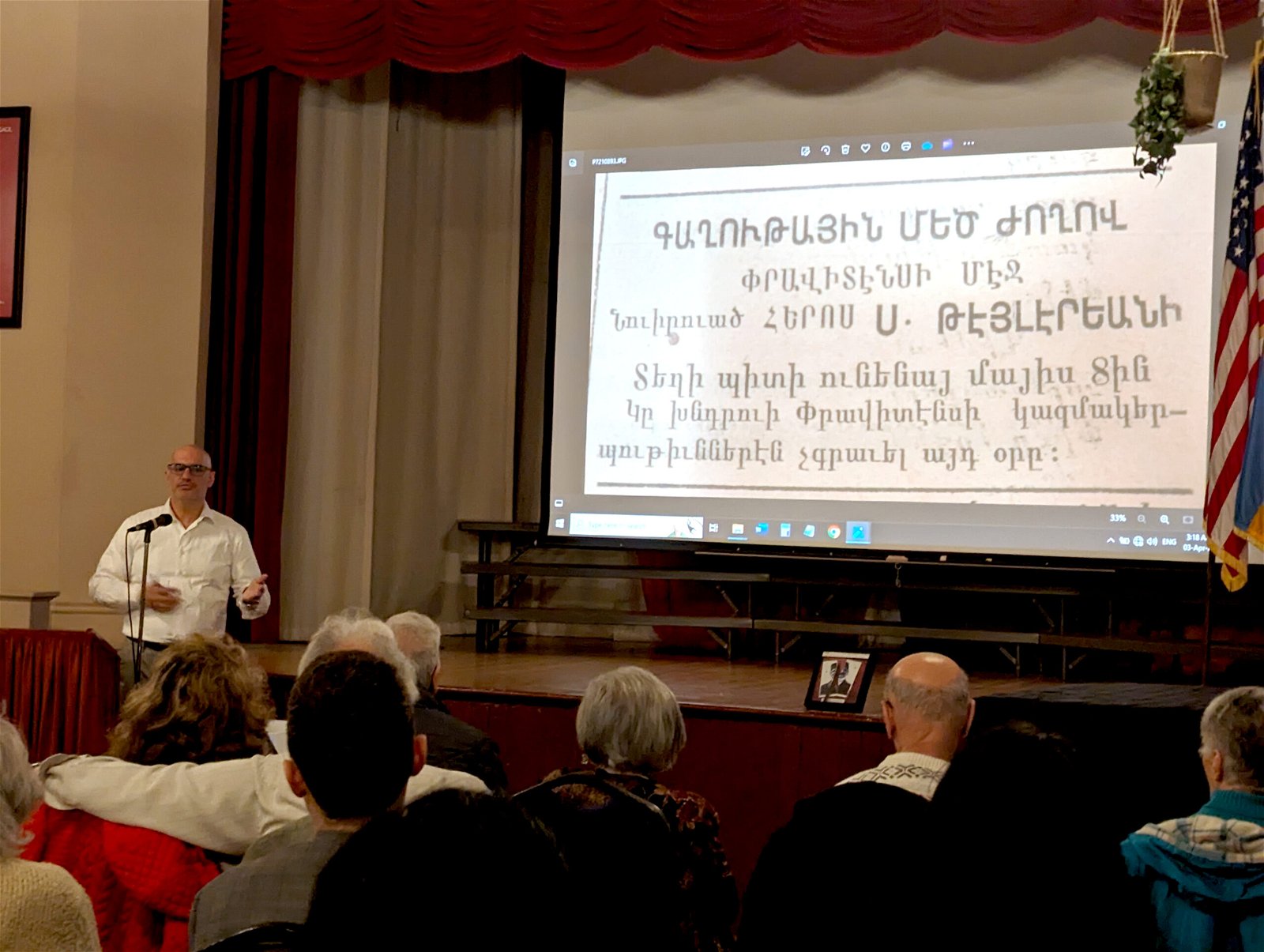 Bedo Demirdjian showing a notice that was printed in the Hairenik newspaper inviting the community to honor the hero Soghomon Tehlirian
Bedo Demirdjian showing a notice that was printed in the Hairenik newspaper inviting the community to honor the hero Soghomon Tehlirian
During his presentation, Demirdjian recounted some of Tehlirian’s recollections, all of which are in the book. He shared that when Tehlirian went to Bolis, he had two hopes: first, to find surviving members of his family, and second, to go after Talaat. One notable woman, Yeranouhi Tanielian, was instrumental in Tehlirian being recruited for Operation Nemesis, then known as the “Special Mission.” Sadly, not much is known of Tanielian, other than that she was a teacher and was closely aligned with Tehlirian and his goals.
At the moment of the assassination, Demirdjian noted, Talaat and Tehlirian came face to face on the street, and Tehlirian said, “Hey Talaat.” It was the first time Talaat had heard his real name since being in Germany. Once he realized what was happening, Talaat turned to run away, and Tehlirian shot him behind his ear. This is contrary to some false narratives, one motivator for Demirdjian’s English translation of Tehlirian’s memoir. The book concludes with Tehlirian’s acquittal and his freedom. As Demirdjian said, “It’s a happy ending.”
While Demirdjian was working on the translation, he noted that Tehlirian had been all over Western Armenia, was with General Antranig and a fedayee. During this part of the translation process, the 2020 war began in Artsakh. Demirdjian was in the Lori region of Armenia working with the Children of Armenia Fund (COAF). They began to see Artsakh refugees pour into the region who needed their assistance.
“For maybe six or seven months, I couldn’t even translate one word, one page,” Demirdjian said. “Whatever Tehlirian had written in his memoir, we were seeing it actually happen in Armenia. We were losing everything, Shushi, everything.”
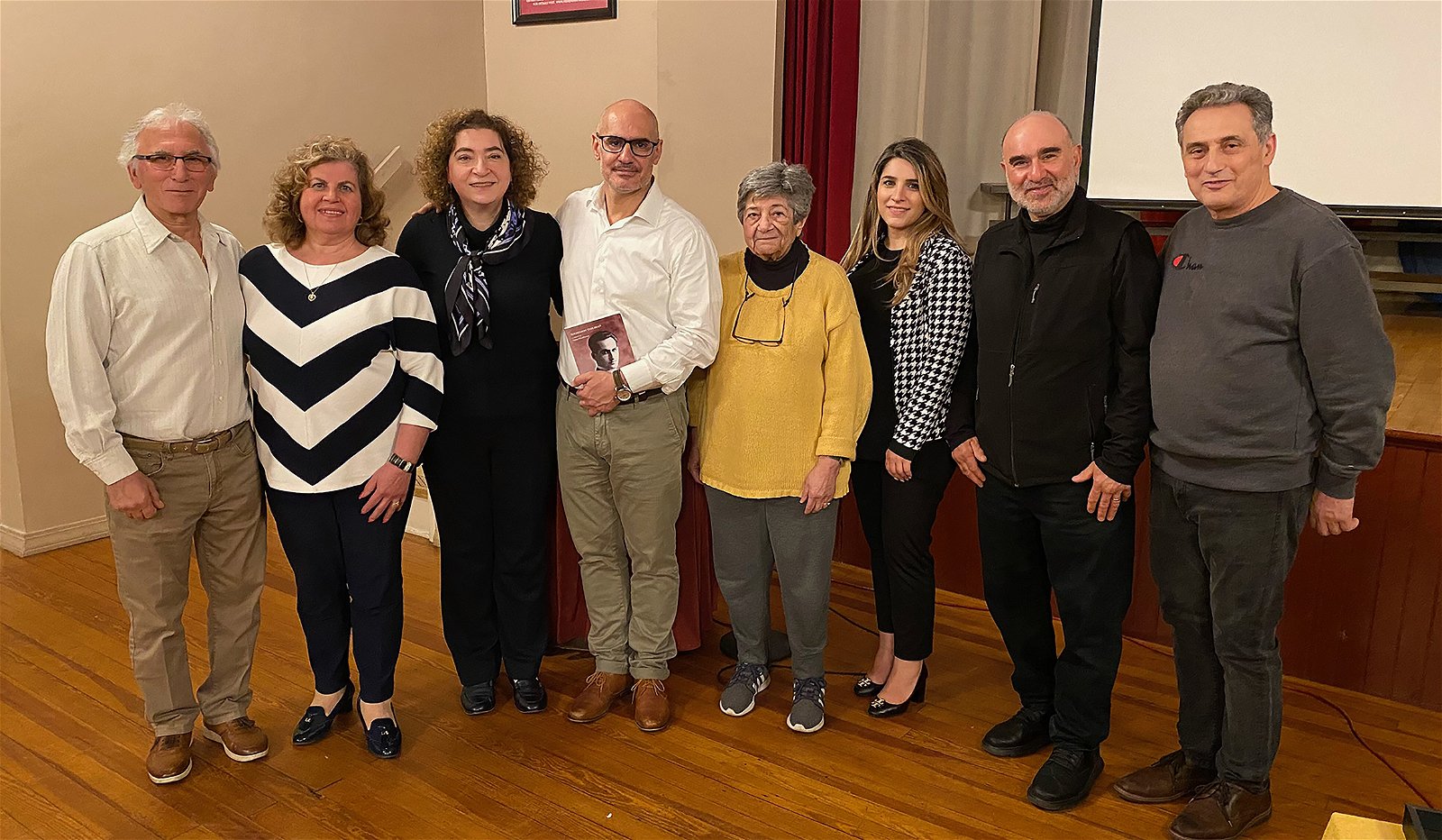 Hamazkayin Providence members Sarkis and Tigranouhi Minassian, Talene Mkrtschjan, Maggie Madarentz, Galin Tashian, Berge Zobian and John Mkrtschjan pictured with Bedo Demirdjian (fourth from left)
Hamazkayin Providence members Sarkis and Tigranouhi Minassian, Talene Mkrtschjan, Maggie Madarentz, Galin Tashian, Berge Zobian and John Mkrtschjan pictured with Bedo Demirdjian (fourth from left)
Once he was able to continue, Demirdjian was determined to complete the translation and publish it, thanks to Ara Sarafian and the Gomidas Institute in London. “My main goal was for the book to be read by Armenians who don’t read Armenian,” he told the Weekly in a conversation. “But as I went on, I gave it a broader audience with the footnotes, the maps and other information.”
Demirdjian noted that the entire operation was quite a feat for the ARF, carried out from three centers around the world: Bolis, Boston/Washington, D.C. and Paris/Geneva. A thoroughly secret operation, the only accounts of Nemesis are from the operatives. Even in the ARF Archives, there is no documentation of the mission. Notably, one of the organizers, Shahan Natalie, coined the operation name, as Nemesis is the Greek god of vengeance.
“Who knows how many other memoirs we have of these guys? We don’t know,” Demirdjian said. “I wish we had them all, but we don’t know.”
Demirdjian told the Weekly that people often ask him about the need for a Tehlirian now. In Tehlirian’s time, as Armenian forces were retreating, it was said, “We are losing our fatherland.” Demirdjian said, “Now, we lost Artsakh, and we don’t have the leaders that we had then. We don’t need a Tehlirian. We need new Armen Garos. We need Shahan Natalies and Aharon Sachaklians. We don’t have the leaders who will create the heroes. We’re losing what they built. We need the nation-builders, not nation losers.”
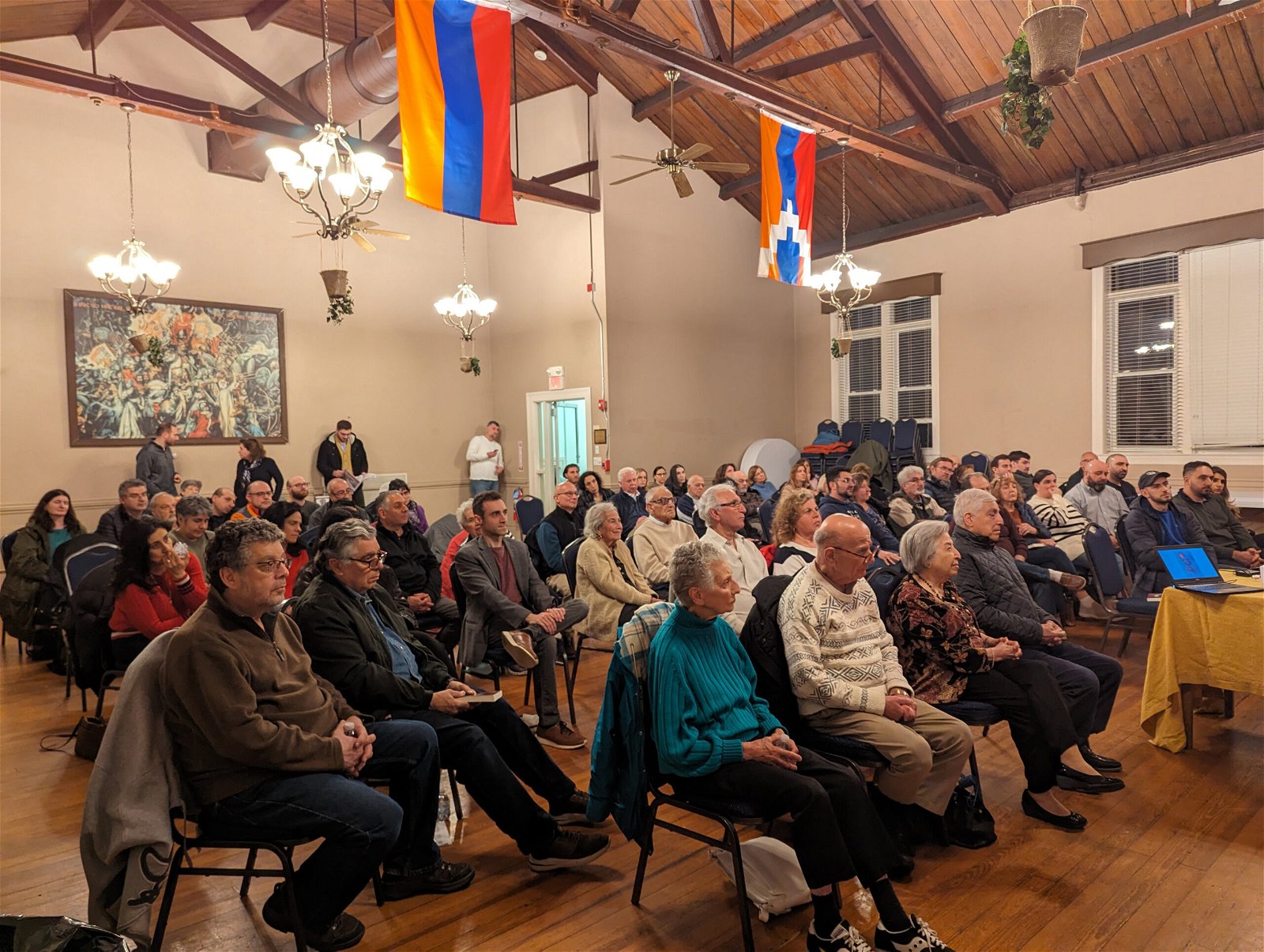 An audience of more than 100 community members listening attentively to Demirdjian’s talk
An audience of more than 100 community members listening attentively to Demirdjian’s talk
Now that Demirdjian has begun sharing the book in the United States (Providence was his first stop), he’s gratified that more people know about its availability. “We have the primary sources and sometimes, we don’t know the worth of it,” he said. “We have to take these primary sources out to the broader audience. If one person starts research because of this book, that’s a big win for me.”
Demirdjian noted the special relationship Tehlirian had with the Hairenik. As he was preparing for a presentation about Remembrances in Boston, Demirdjian felt it to be a full-circle moment. In his memoir, Tehlirian writes, “Established in a remote community but closely connected to the homeland, Hairenik newspaper and publishing house played an important role [in Armenian national life]. It is an indisputable fact that if Armenians had managed to maintain their identity in the diaspora, it was largely due to the organized work carried out by Armenian civil and political organizations, their newspapers, and publications. Hairenik had a major place in that family of publications.”
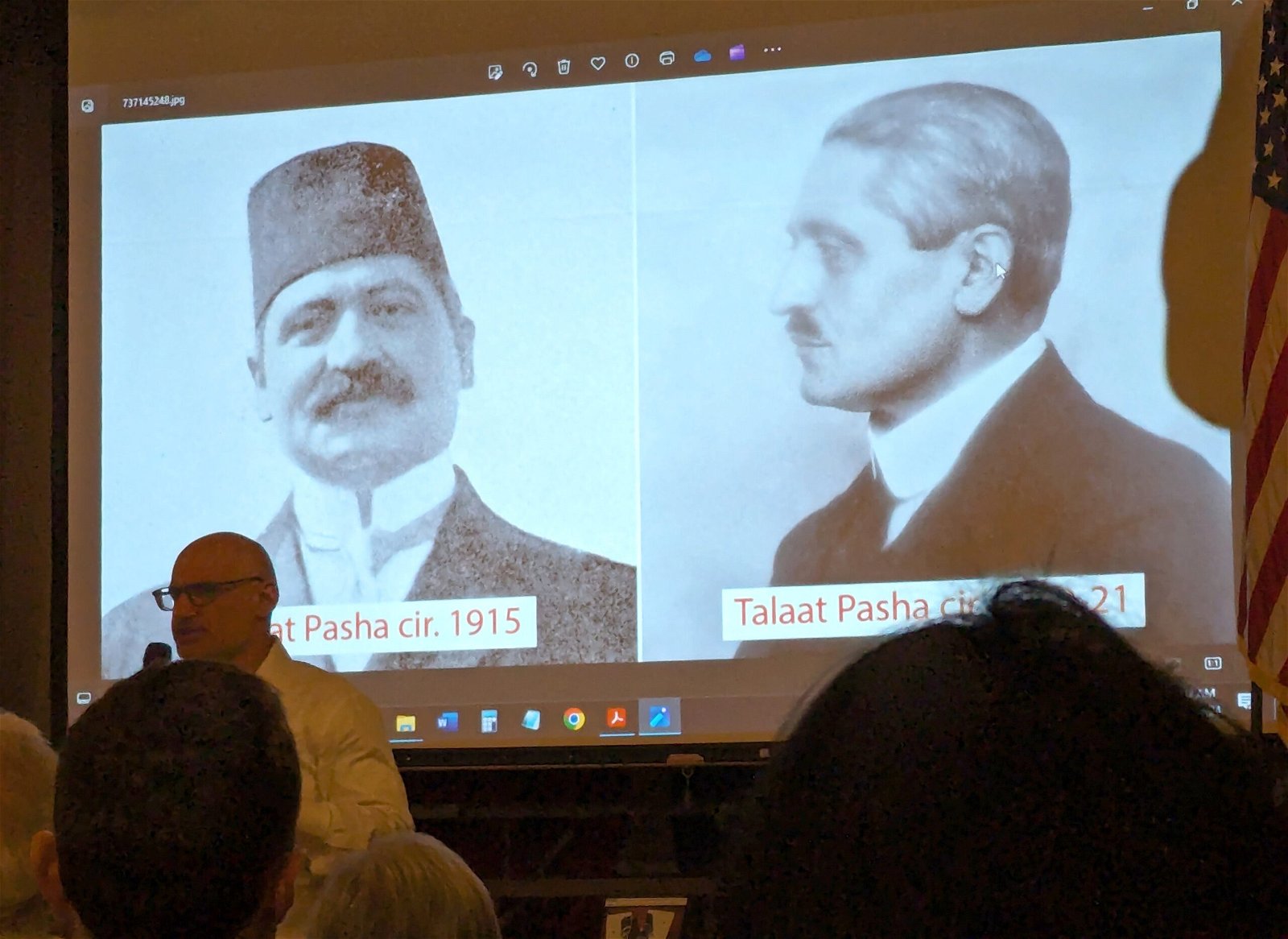 Demirdjian illustrated the change in Talaat’s appearance from 1915 during the Genocide to 1921 in Germany with this slide
Demirdjian illustrated the change in Talaat’s appearance from 1915 during the Genocide to 1921 in Germany with this slide
When asked what his next project is, Demirdjian said he’s working on the translation of Alexander Khatisian’s monumental work The Origin and Development of the Republic of Armenia. Khatisian was the first minister of foreign affairs and second prime minister of Armenia from 1918-1920. Additionally, the e-book and audiobook of Remembrances are in the works and will be available soon.
Organized by the Providence Hamazkayin chapter, more than 100 community members filled the Aramian Auditorium at Sts. Vartanantz Armenian Apostolic Church to learn more about Demirdjian’s English translation of Tehlirian’s memoir. Hamazkayin member Berge Zobian served as emcee for the evening, and Providence ARF chair Garo Tashian introduced Demirdjian. Born in Beirut, he is a graduate of the Melkonian Educational Institute in Nicosia, Cyprus and studied economics and European Union economic integration in Athens. In 2020, Demirdjian repatriated to Armenia with his family. Currently, he resides in Yerevan and works at the Tufenkian Charitable Foundation.
Author information
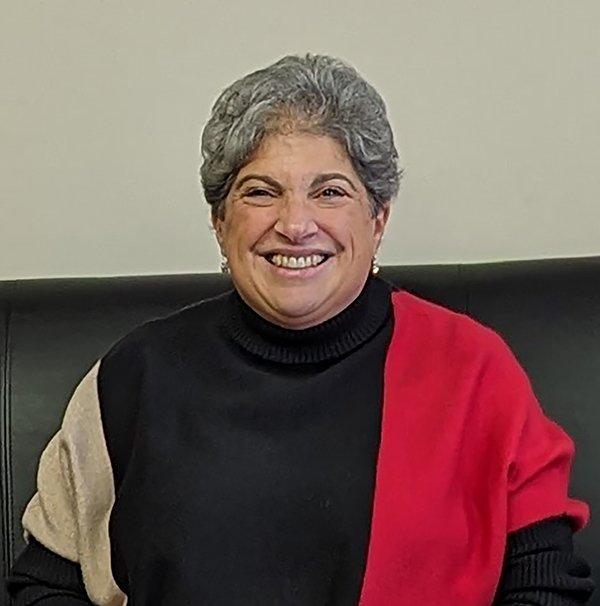
Pauline Getzoyan
Pauline Getzoyan is editor of the Armenian Weekly and an active member of the Rhode Island Armenian community. A longtime member of the Providence ARF and ARS, she also is a former member of the ARS Central Executive Board. An advocate for genocide education, Pauline is the chair of the RI Holocaust & Genocide Education Commission and co-chair of the RI branch of The Genocide Education Project. In addition, she has been an adjunct instructor of developmental reading and writing in the English department at the Community College of Rhode Island since 2005.
The post “Remembrances” with Bedo Demirdjian in Providence appeared first on The Armenian Weekly.
